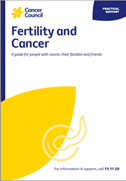- Home
- About Cancer
- Managing side effects
- Fertility and cancer
- Treatment side effects and fertility
- Chemotherapy
Chemotherapy
Chemotherapy uses drugs to kill or slow the growth of cancer cells. These drugs travel throughout the body and are designed to affect fast-growing cells such as cancer cells.
This means they can also damage other cells that grow quickly, including in the ovaries. If treatment reduces the total number of eggs, there is a high risk of infertility.
Effect on ovaries
Some chemotherapy drugs can stop the ovaries from working properly and releasing eggs (ovulation). If chemotherapy destroys or damages eggs, your body won’t be able to replace them.
Chemotherapy drugs can cause your periods to become irregular or even stop for a while. Depending on your age, number of eggs and the amount of chemotherapy you’ve had, your periods may return within a year of finishing treatment. If your periods do not return, the ovaries may have stopped working permanently, causing premature or early menopause.
Effect on testicles
The effects of chemotherapy on the sperm you make may be temporary or permanent. Chemotherapy can cause permanent infertility if the cells in the testicles are too damaged to produce healthy, mature sperm again.
Effect on your heart and lungs
Some chemotherapy drugs can affect your heart and lungs. If this causes long-term damage, it may make a future pregnancy and delivery more difficult. Your specialist will talk to you about what precautions to take during pregnancy.
→ READ MORE: The impact of radiation therapy on fertility
Podcast: Making Treatment Decisions
Listen to more episodes from our podcast for people affected by cancer
More resources
Prof Martha Hickey, Professor of Obstetrics and Gynaecology, The University of Melbourne and Director, Gynaecology Research Centre, The Royal Women’s Hospital, VIC; Dr Sally Baron-Hay, Medical Oncologist, Royal North Shore Hospital and Northern Cancer Institute, NSW; Anita Cox, Cancer Nurse Specialist and Youth Cancer Clinical Nurse Consultant, Gold Coast University Hospital, QLD; Kate Cox, McGrath Breast Health Nurse Consultant, Gawler/ Barossa Region, SA; Jade Harkin, Consumer; A/Prof Yasmin Jayasinghe, Director Oncofertility Program, The Royal Children’s Hospital, Chair, Australian New Zealand Consortium in Paediatric and Adolescent Oncofertility, Senior Research Fellow, The Royal Women’s Hospital and The University Of Melbourne, VIC; Melissa Jones, Nurse Consultant, Youth Cancer Service SA/NT, Royal Adelaide Hospital, SA; Dr Shanna Logan, Clinical Psychologist, The Hummingbird Centre, Newcastle West, NSW; Stephen Page, Family Law Accredited Specialist and Director, Page Provan, QLD; Dr Michelle Peate, Program Leader, Psychosocial Health and Wellbeing Research (emPoWeR) Unit, Department of Obstetrics and Gynaecology, The Royal Women’s Hospital and The University of Melbourne, VIC; Pampa Ray, Consumer; Prof Jane Ussher, Chair, Women’s Health Psychology, and Chief Investigator, Out with Cancer study, Western Sydney University, NSW; Prof Beverley Vollenhoven AM, Carl Wood Chair, Department of Obstetrics and Gynaecology, Monash University and Director, Gynaecology and Research, Women’s and Newborn, Monash Health and Monash IVF, VIC; Lesley Woods, 13 11 20 Consultant, Cancer Council WA.
View the Cancer Council NSW editorial policy.
View all publications or call 13 11 20 for free printed copies.

